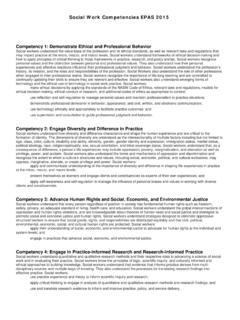Transcription of NASW Code of Ethics - SDSU School of Social Work
1 code OF ETHICSOFTHENATIONALASSOCIATIONOFSOCIALWO RKERSCode of Ethics of the National Association of Social WorkersOVERVIEWThe NASW code of Ethicsis intended to serve as a guide to the everyday professional conduct of Social workers. This Codeincludesfour sections. The first section, Preamble, summarizes the Social work profession s mission and core values. The second section, Purpose of the NASW code of Ethics , provides an overview of theCode s main functions and a brief guide for dealing with ethical issuesor dilemmas in Social work practice. The third section, EthicalPrinciples, presents broad ethical principles, based on Social work s core values, that inform Social work practice. The final section, Ethical Standards, includes specific ethical standards to guide socialworkers conduct and to provide a basis for National Association of Social Workers (NASW) is the largestorganization of professional Social workers in the world.
2 NASW servessocial workers in 55 chapters throughout the United States, Puerto Rico,the Virgin Islands, Guam, and abroad. NASW was formed in 1955through a merger of seven predecessor Social work organizations tocarry out three responsibilities: strengthen and unify the profession promote the development of Social work practice advance sound Social high standards of practice and protecting the consumer ofservices are major association by the 1996 NASW Delegate Assembly and revised by theNASW Delegate Assembly in 2017. 2017 National Association of Social Workers. All Rights primary mission of the Social work profession is to enhance humanwell-being and help meet the basic human needs of all people, withparticular attention to the needs and empowerment of people who arevulnerable, oppressed, and living in poverty. A historic and defining featureof Social work is the profession s dual focus on individual well-being in asocial context and the well-being of society.
3 Fundamental to Social work isattention to the environmental forces that create, contribute to, and addressproblems in workers promote Social justice and Social change with and onbehalf of clients. Clients is used inclusively to refer to individuals,families, groups, organizations, and communities. Social workers aresensitive to cultural and ethnic diversity and strive to end discrimination,oppression, poverty, and other forms of Social injustice. These activitiesmay be in the form of direct practice, community organizing, supervision,consultation, administration, advocacy, Social and political action, policydevelopment and implementation, education, and research and workers seek to enhance the capacity of people to address their ownneeds. Social workers also seek to promote the responsiveness oforganizations, communities, and other Social institutions to individuals needs and Social mission of the Social work profession is rooted in a set of corevalues.
4 These core values, embraced by Social workers throughout theprofession s history, are the foundation of Social work s unique purpose and perspective: service Social justice dignity and worth of the person importance of human relationships integrity competence. This constellation of core values reflects what is unique to the socialwork profession. Core values, and the principles that flow from them, mustbe balanced within the context and complexity of the human of the NASWCode of EthicsProfessional Ethics are at the core of Social work. The profession has anobligation to articulate its basic values, ethical principles, and ethicalstandards. The NASW code of Ethicssets forth these values, principles, andstandards to guide Social workers conduct. The Codeis relevant to allsocial workers and Social work students, regardless of their professionalfunctions, the settings in which they work, or the populations they NASW code of Ethicsserves six purposes: Codeidentifies core values on which Social work s mission is based.
5 Codesummarizes broad ethical principles that reflect theprofession s core values and establishes a set of specific ethicalstandards that should be used to guide Social work practice. Codeis designed to help Social workers identify relevantconsiderations when professional obligations conflict or ethicaluncertainties arise. Codeprovides ethical standards to which the general public can hold the Social work profession accountable. Codesocializes practitioners new to the field to Social work smission, values, ethical principles, and ethical standards. Codearticulates standards that the Social work profession itselfcan use to assess whether Social workers have engaged in unethicalconduct. NASW has formal procedures to adjudicate ethicscomplaints filed against its members.* In subscribing to this code , Social workers are required to cooperate in its implementation,participate in NASW adjudication proceedings, and abide by anyNASW disciplinary rulings or sanctions based on it.
6 The Codeoffers a set of values, principles, and standards to guidedecision making and conduct when ethical issues arise. It does not provide a set of rules that prescribe how Social workers should act in all applications of the Codemust take into account the context in *For information on NASW adjudication procedures, see NASW Procedures for ProfessionalReview: it is being considered and the possibility of conflicts among theCode s values, principles, and standards. Ethical responsibilities flow fromall human relationships, from the personal and familial to the Social , the NASW code of Ethicsdoes not specify which values,principles, and standards are most important and ought to outweigh othersin instances when they conflict. Reasonable differences of opinion can anddo exist among Social workers with respect to the ways in which values,ethical principles, and ethical standards should be rank ordered when theyconflict.
7 Ethical decision making in a given situation must apply theinformed judgment of the individual Social worker and should also considerhow the issues would be judged in a peer review process where the ethicalstandards of the profession would be decision making is a process. In situations when conflictingobligations arise, Social workers may be faced with complex ethicaldilemmas that have no simple answers. Social workers should take intoconsideration all the values, principles, and standards in this code that arerelevant to any situation in which ethical judgment is warranted. Socialworkers decisions and actions should be consistent with the spirit as well asthe letter of this addition to this code , there are many other sources of informationabout ethical thinking that may be useful. Social workers should considerethical theory and principles generally, Social work theory and research,laws, regulations, agency policies, and other relevant codes of Ethics ,recognizing that among codes of Ethics Social workers should consider theNASW code of Ethicsas their primary source.
8 Social workers also shouldbe aware of the impact on ethical decision making of their clients and theirown personal values and cultural and religious beliefs and practices. Theyshould be aware of any conflicts between personal and professional valuesand deal with them responsibly. For additional guidance Social workersshould consult the relevant literature on professional Ethics and ethicaldecision making and seek appropriate consultation when faced with ethicaldilemmas. This may involve consultation with an agency-based or socialwork organization s Ethics committee, a regulatory body, knowledgeablecolleagues, supervisors, or legal may arise when Social workers ethical obligations conflictwith agency policies or relevant laws or regulations. When such conflictsoccur, Social workers must make a responsible effort to resolve the conflictin a manner that is consistent with the values, principles, and standardsexpressed in this code .
9 If a reasonable resolution of the conflict does notappear possible, Social workers should seek proper consultation beforemaking a decision. 3 The NASW code of Ethicsis to be used by NASW and by individuals,agencies, organizations, and bodies (such as licensing and regulatoryboards, professional liability insurance providers, courts of law, agencyboards of directors, government agencies, and other professional groups)that choose to adopt it or use it as a frame of reference. Violation ofstandards in this Codedoes not automatically imply legal liability orviolation of the law. Such determination can only be made in the context of legal and judicial proceedings. Alleged violations of the code would be subject to a peer review process. Such processes are generally separatefrom legal or administrative procedures and insulated from legal review or proceedings to allow the profession to counsel and discipline its own code of Ethics cannot guarantee ethical behavior.
10 Moreover, a code ofethics cannot resolve all ethical issues or disputes or capture the richnessand complexity involved in striving to make responsible choices within amoral community. Rather, a code of Ethics sets forth values, ethicalprinciples, and ethical standards to which professionals aspire and by whichtheir actions can be judged. Social workers ethical behavior should resultfrom their personal commitment to engage in ethical practice. The NASWCode of Ethicsreflects the commitment of all Social workers to uphold theprofession s values and to act ethically. Principles and standards must beapplied by individuals of good character who discern moral questions and,in good faith, seek to make reliable ethical growth in the use of communication technology in various aspectsof Social work practice, Social workers need to be aware of the uniquechallenges that may arise in relation to the maintenance of confidentiality,informed consent, professional boundaries, professional competence, recordkeeping, and other ethical considerations.


